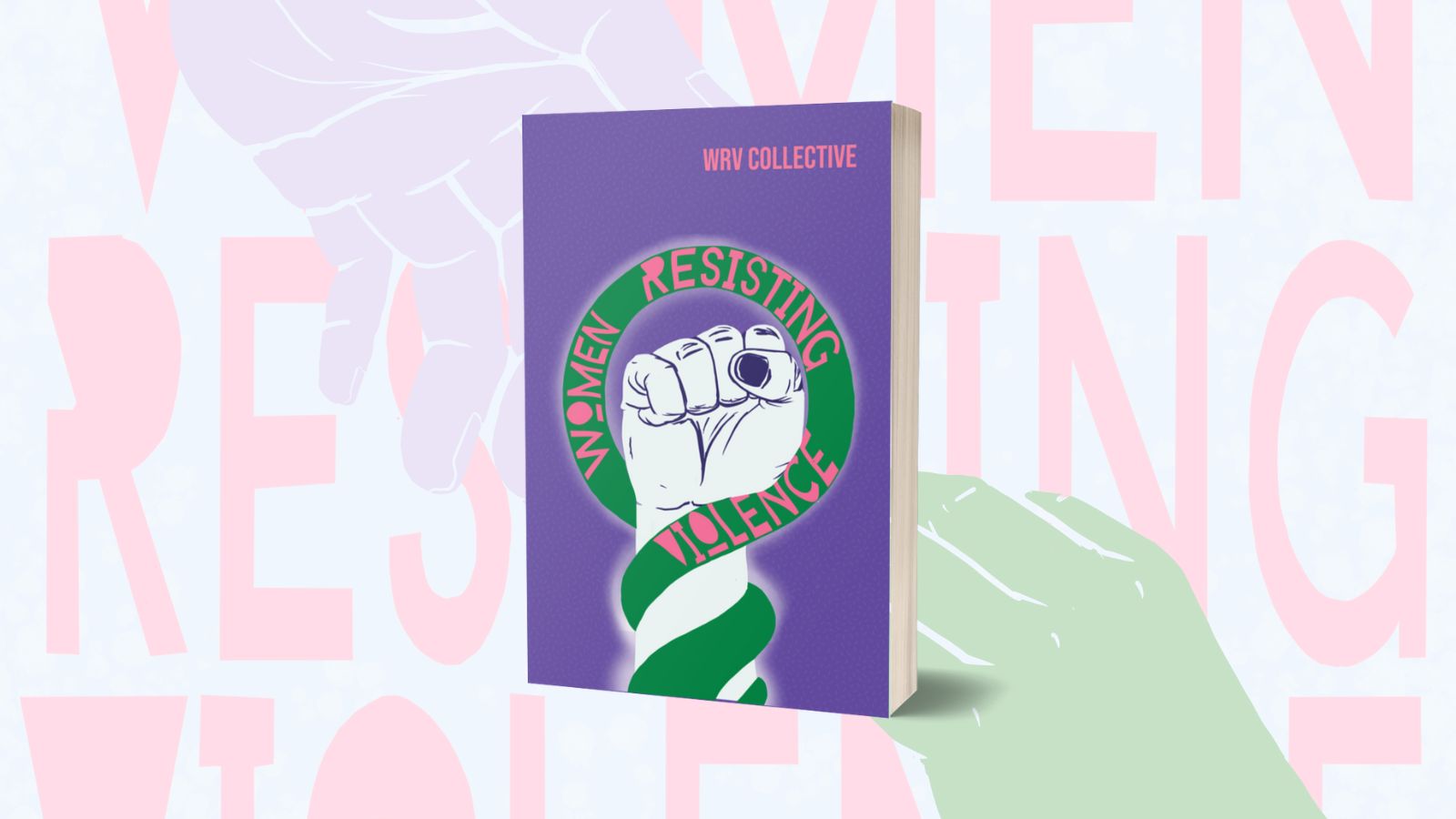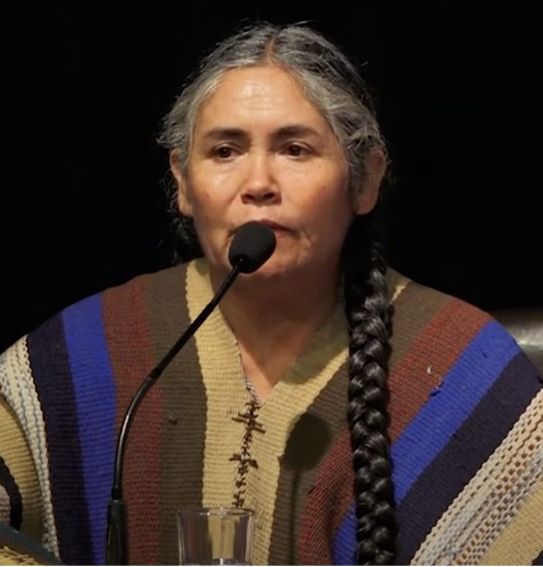This website is hosted by Latin America Bureau (LAB).

Chapter 4: ‘Violence on our bodies, violence on our lands’ - Resisting land grabbing and environmental violence
This chapter by Patricia Muñoz Cabrera shows how environmental violence has accentuated sexual violence against rural women land defenders. It focusses on the ways in which violence generated by land grabbing has been particularly disempowering for women from rural, peasant, Indigenous and Afro-descendant communities living in areas rich in natural resources. It showcases women’s struggles to counter the harm done to their bodies and territories by land grabbing, and their proposals to policymakers to implement economic models that are enshrined in fundamental human rights, and in particular in women’s rights. The chapter also maps out women’s relentless work to raise awareness and mobilize constituencies on the connections between women’s human rights and nature’s rights at the local, national, and international levels.

About the author
Patricia Muñoz Cabrera (PhD) is an international research consultant and trainer on gender and intersectionality in development policies. Her Postdoctoral research in sociology (U. of Sao Paulo, Brazi) focused on intersectional analysis of public policies in Argentina, Brazil and Chile. She has worked for European and international institutions, NGOs and grassroots organizations. She was the Chair of the former WIDE Network and is currently a member of the working group on feminist economic literacy at WIDE+. Her current research work focuses on the political economy of intersectional violence.
Bibliography
Alonso-Fradejas, A. (2013) ‘Land & sovereignty in the Americas’, TNI, issue brief 1, https://www.tni.org/files/download/land-sov_series_briefs_-_ndeg1_alonso-fradejas_final.pdf
ANAMURI Chile (no date), ‘Pesticides. Radio topic 34’, https://www.anamuri.cl/cu%C3%B1as
ANAMURI (2017) ‘Yo no elegí ser sacrificable…calama: zona de sacrificio’, Tribunal Ético Calama, Chile, Sábado 29 de octubre, Sede de la CUT de Calama, Vargas #2201, https://www.anamuri.cl/copia-de-semilla
ANMC – Associação Nacional de Mulheres Camponesas (2021). FEMINISMO CAMPESINO POPULAR Reflexiones a partir de experiencias en el Movimiento de Mujeres Campesinas de Brasil (MMC). 1st ed en español. Passo Fundo, https://bizilur.eus/wp-content/uploads/2021/10/FEMINISMO-CAMPESINO-POPULAR_MMC-BRASIL-ESP.pdf
Araya, E. (2022), interviewed by Patricia Muñoz Cabrera, 21 January
Barcellos, G.H. and Batista Ferreira, S. (2008) ‘Women and eucalyptus: stories of life and resistance’, World Rainforest Movement, https://www.wrm.org.uy//wp-content/uploads/2013/02/Book_Women.pdf
Bolaños, O. (2020) ‘Latin America’s indigenous and afro-descendant women face a “triple pandemic”’, https://news.trust.org/item/20200709182830-27m6r
Bonilha, P. (2019) ‘Mulheres indígenas debatem mudanças climáticas para garantir proteção territorial’, BiodiversidadLA, https://www.biodiversidadla.org/Noticias/Mulheres-indigenas-debatem-mudancas-climaticas-para-garantir-protecao-territorial
Brigada, N.A., Galvão, R. and Flávio L. (2019) ‘Edilena Krikati: “As pessoas não disfarçam mais o preconceito contra indígenas”’, Midia Ninja, https://brigada.midianinja.org/edilena-krikati-as-pessoas-nao-disfarcam-mais-o-preconceito-contra-indigenas/
Cárdenas, K. (2020) ‘Resistir: mujeres rurales en contra del extractivismo (el caso de ANAMURI, Chile)’, BiodiversidadLA, https://www.biodiversidadla.org/Multimedia/Video/Resistir-mujeres-rurales-en-contra-del-extractivismo-el-caso-de-ANAMURI-Chile
Camargos, D. (2021) ‘Zero convictions as impunity blocks justice for victims of Brazil’s rural violence’, Mongabay,
https://news.mongabay.com/2021/02/zero-convictions-as-impunity-blocks-justice-for-victims-of-brazils-rural-violence
Castro, N. (2018) ‘IN Boletín Nº 236 del WRM’, WRM, March, https://www.wrm.org.uy//es/files/2018/03/Bolet%c3%adn-236_ESP.pdf
CEDAW (2016) ‘Convention on the elimination of all forms of discrimination against women. General recommendation No. 34 (2016) on the rights of rural women’,
https://tbinternet.ohchr.org/_layouts/15/treatybodyexternal/TBSearch.aspx?Lang=en&TreatyID=3&DocTypeID=11
CEDAW (2019) ‘Primer informe sombra específico de mujeres rurales y campesinas en Colombia’,
https://d3o3cb4w253x5q.cloudfront.net/media/documents/infoalternomcr-07.pdf
CIDH (2015) ‘Pueblos indígenas, comunidades afrodescendientes y recursos naturales’, http://www.oas.org/es/cidh/informes/pdfs/industriasextractivas2016.pdf
Congress.gov. Text – H.R.1574 – 117th Congress (2021-2022), ‘Berta Cáceres Human Rights in Honduras Act’, 3 March, https://www.congress.gov/bill/117th-congress/house-bill/1574/text
Copinh (2021) ‘Honduras: agentes estatales implicados en asesinato de Berta Cáceres’, https://berta.copinh.org/tag/gaipe
Cyrus R. Vance Center for International Justice, Earth Law Center and International Rivers (2020), ‘Rights of rivers. A global survey of the rapidly developing rights of nature jurisprudence pertaining to rivers’,
https://3waryu2g9363hdvii1ci666p-wpengine.netdna-ssl.com/wp-content/uploads/sites/86/2020/09/Right-of-Rivers-Report-V3-Digital-compressed.pdf
ECMIA (2021) ‘Aportes del enlace continental de mujeres indígenas de las Américas (ECMIA) y CHIRAPAQ Centro de culturas indígenas del Perú sobre el borrador de la recomendación general n*39 sobre los derechos de las mujeres y niñas indígenas’
Fajardo, Lennys (2021) ‘No vamos a comer eucaliptos: las mujeres Qom se organizan para preservar su territorio’, Red de desarollo sostenible Honduras, https://portal.rds.hn/archivos/4328
FAO/AECDI (2021), La protección de los derechos de las mujeres rurales en América Latina, estado actual de la legislación y políticas existentes en el contexto de post pandemia COVID-19’, https://intercoonecta.aecid.es/Gestin%20del%20conocimiento/Mujeres-Rurales-%20derechos.pdf
FIMI (2021) ‘Input to the committee on the draft of the CEDAW general recommendation no. 39 on the rights of indigenous women and girls, OHCR, https://www.ohchr.org/EN/HRBodies/CEDAW/Pages/Draft-GR-rights-Indigenous-women-and-girls.aspx
FIMI (2020) Global study on the situation of indigenous women and girls in the framework of the 25th anniversary of the Beijing declaration and platform for action, https://fimi-iiwf.org/wp-content/uploads/2020/09/GlobalStudyFIMI_20-englishRGB-2.pdf
FIMI (2006) ‘Mairin Iwanka Raya. Indigenous women stand against violence. a companion report to the United Nations secretary’, General Study on Violence Against Women
Hivos (2021) ‘Demanding justice for indigenous peoples’, https://hivos.org/news/demanding-justice-for-Indigenous-peoples
Mayara M. et al. (2018) ‘Agronegocio e injusticia ambiental: los impactos sobre la salud de las mujeres del campo’, WRM, https://wrm.org.uy/es/boletines/nro-236
Minga (2022) ‘Suprema acoge recurso de protección de comunidades indígenas contra proyecto de grupo Errázuriz para explotar litio en salar de Maricunga en Atacama’, El Ciudadano, https://www.elciudadano.com/actualidad/suprema-acoge-recurso-de-proteccion-de-comunidades-indigenas-contra-proyecto-de-grupo-errazuriz-para-explotar-litio-en-salar-de-maricunga-en-atacama/02/15/
Morales De la Cruz, A. (2022) ‘In the Ecuadorian Amazon, Wituk facepainting is an act of resistance’. Vogue, https://www.vogue.com/article/kichwa-women-sarayaku-amazon-wituk-face-painting
Muñoz Cabrera, P. (2018), ‘Campos baldios: extrativismo e violências interseccionais’, Cadernos Adenauer 19(1), pp.161–175,
https://www.kas.de/wf/doc/25929-1442-5-30.pdf
Muñoz Cabrera, P. (2019) ‘A justiça de gênero na América Latina: convergências e dissonâncias nos contextos analíticos feministas’, in: Alterman Blay, E. et al. (eds.) Gênero e feminismos: Argentina, Brasil e Chile en transformaçao. Sao Paulo: EDUSP/FAPESP
Observatorio Ciudadano (2018) ‘Ercilia Araya – el primer panel sobre las violaciones de derechos humanos de pueblos indígenas en dictadura’, https://www.youtube.com/watch?v=RgyXANt8qnY
Raízes (2018) ‘Povos indígenas e quilombolas: 3 motivos pelos quais a demarcação de terras é importante’, Raízes, https://raizesds.com.br/ pt/povos-indigenas-quilombolas
Solano Ortíz, L (2015) ‘Mujer, violencia e industria minera’, Tequio Jurídico, https://tequiojuridico.org/tequiojuridico/2015/12/DEFENSORAS-DEL-TERRITORIO.pdf
UN (1995) ‘Report of the fourth world conference on women Beijing, 4-15 September 1995’, https://www.un.org/womenwatch/daw/beijing/pdf/Beijing%20full%20report%20E.pdf
UN (2010) ‘Declaration for health, life and defense of our land, rights and future Generations’, 1st International Indigenous Women’s Environmental and Reproductive Health Symposium, June 30 – July 1, UN Permanent Forum’s 10th session,
https://www.un.org/esa/socdev/unpfii/documents/EGM12_carmen_waghiyi.pdf
UN (2007) ‘UNDRIP – United Nations declaration of the rights of indigenous people’, https://www.un.org/development/desa/Indigenouspeoples/wp-content/uploads/sites/19/2018/11/UNDRIP_E_web.pdf
Via Campesina (2003) ‘Que es la soberania alimentaria. La via campesina – movimiento campesino internacional’,
https://viacampesina.org/es/que-es-la-soberania-alimentaria
World Rainforest Movement (2014) ‘Women and oil: the struggle for Sumak Kawsay’, WRM Bulletin 200, 5 April, https://www.wrm.org.uy/bulletin-articles/women-and-oil-the-struggle-for-sumak-kawsay
World Rainforest Movement (2021) ‘Mesoamerican meeting of communities against oil palm’, WRM Bulletin, 17 December, https://www.wrm.org.uy/bulletin-articles/mesoamerican-meeting-of-communities-against-oil-palm
Chapters
Click through to learn more, find extra information, and access online references:
Women Resisting Violence: Voices and Experiences from Latin America
Chapter 2. ‘Care for those who care’: Domestic workers fight back against violence – Marilyn Thomson
Chapter 4. ‘Violence on our lands, violence on our bodies’: Women resisting land grabbing and environmental violence – Patricia Muñoz Cabrera
Conclusions and Recommendations
Appendix: Women Resisting Violence, the multilingual podcast
Press release
For press enquiries contact wrv@lab.org.uk. You can find press materials here.








